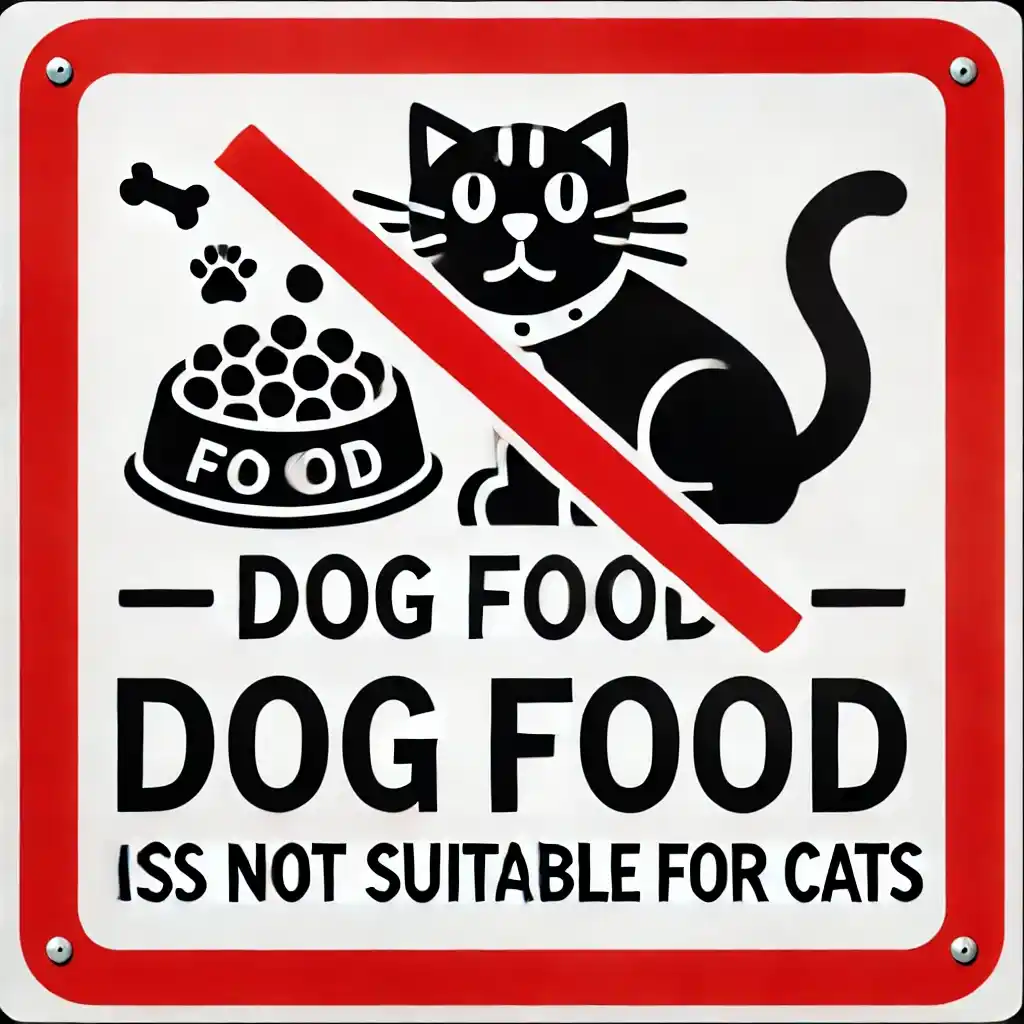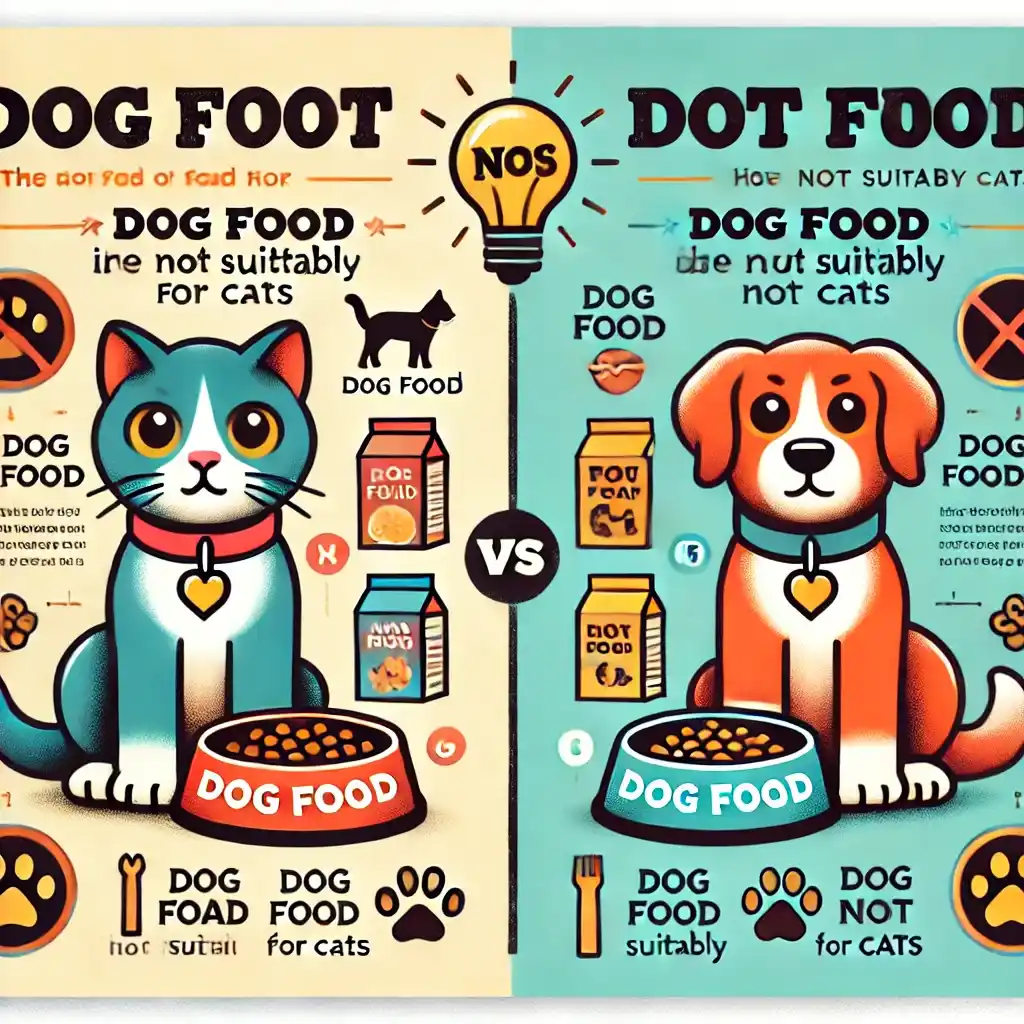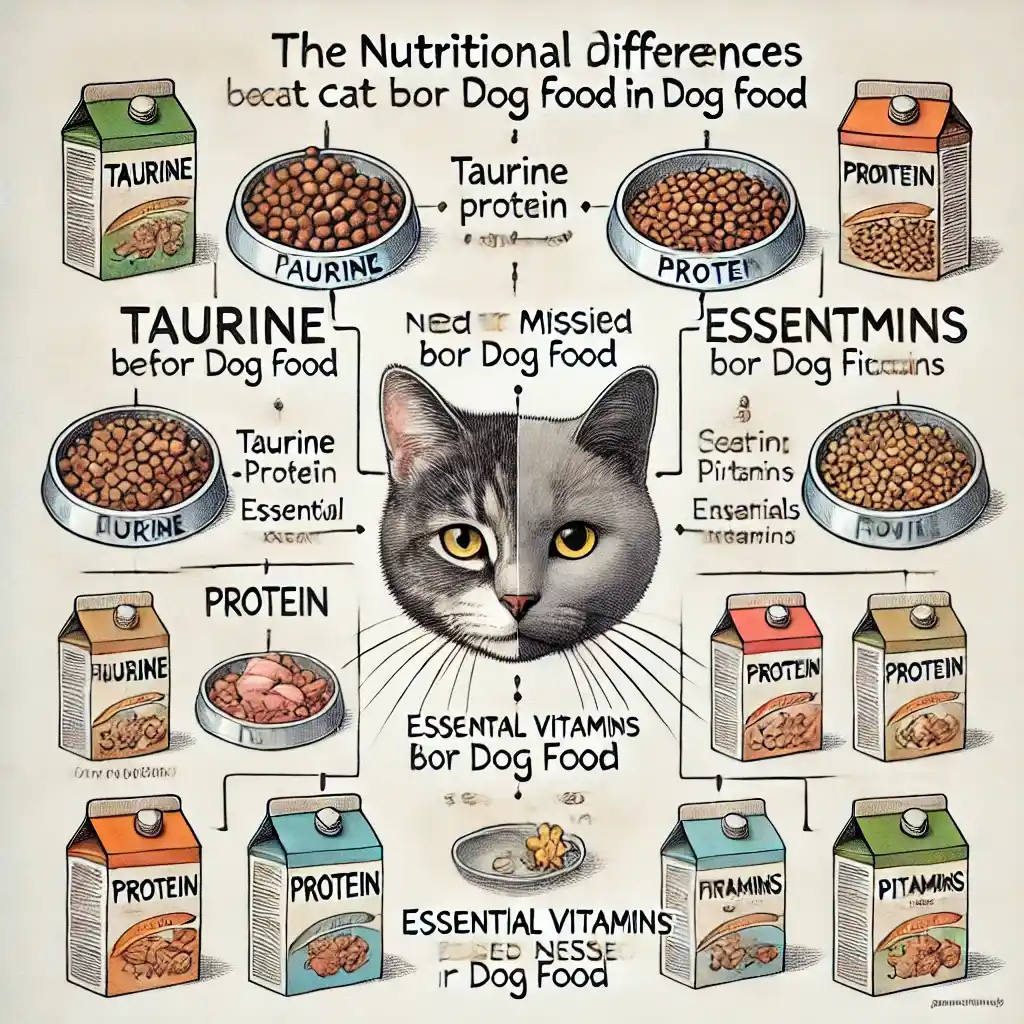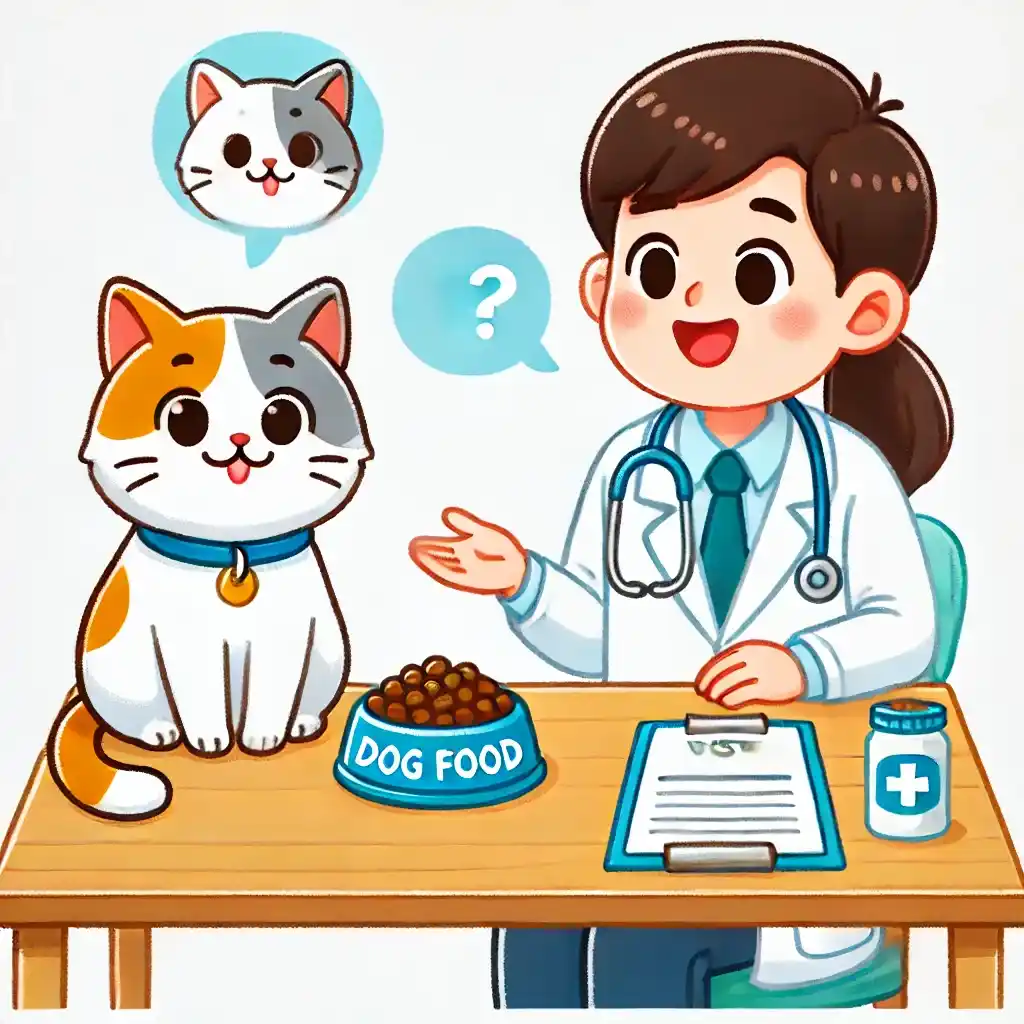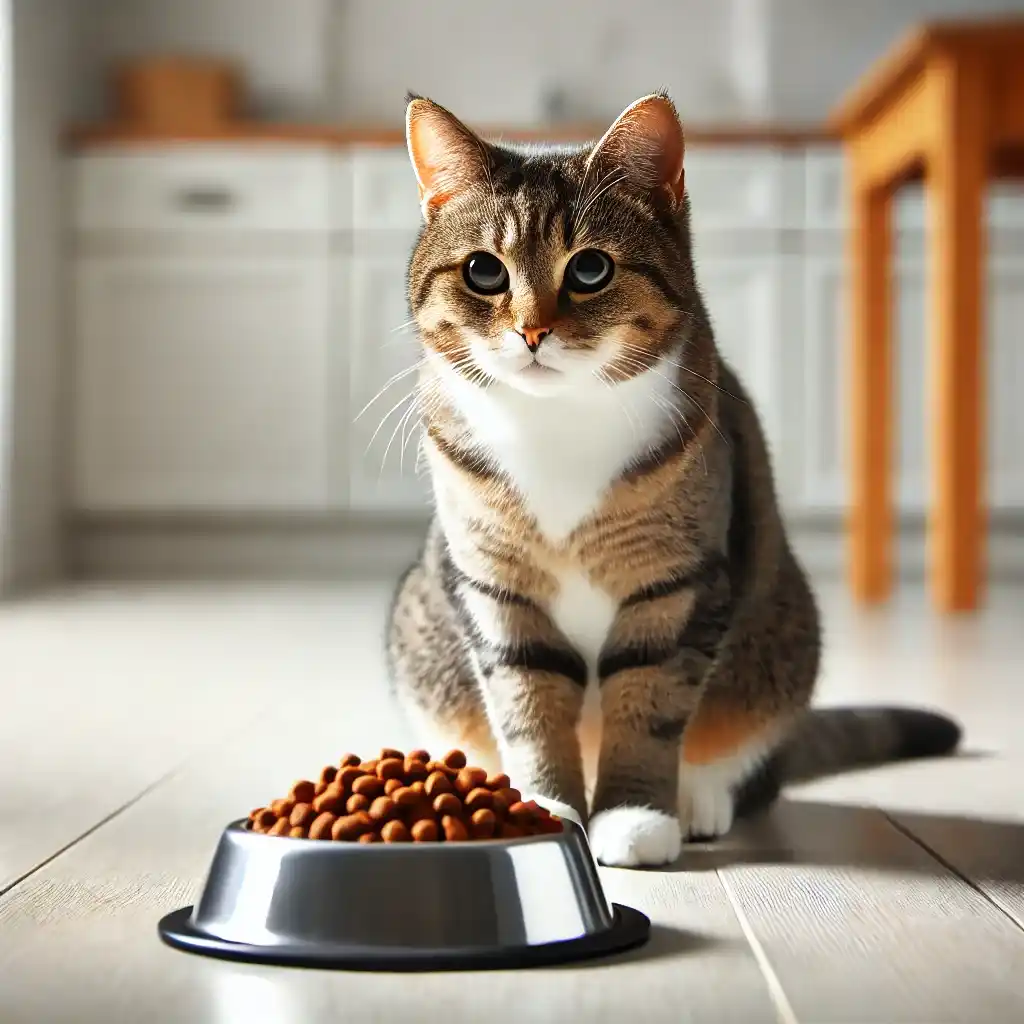Can Cats Eat Dog Food is a common question for pet owners who care for both cats and dogs. While it might seem convenient to let your cat nibble on dog food, the nutritional needs of these two animals differ significantly. In this article, we’ll explore whether cats can safely eat dog food, the risks involved, and what to do if it becomes a regular habit.
read it: Can Cats Eat Bread?
Can Cats Eat Dog Food?
Yes, cats can eat dog food occasionally without immediate harm, but it’s not suitable for long-term consumption. Dog food is formulated for dogs’ dietary needs and lacks essential nutrients required by cats, such as taurine and high protein levels.
read it: Can Cats Eat Watermelon?
Key Differences Between Cat and Dog Food
Understanding the key differences between cat and dog food is essential when asking questions like can cats eat dog food. Cats and dogs have distinct dietary needs due to their differing biological and nutritional requirements. Here are the most critical differences:
1. Protein Content
Cats are obligate carnivores and require a diet high in animal-based protein. Dog food, while suitable for omnivorous dogs, often contains lower protein levels, which can lead to deficiencies in cats.
2. Taurine
Taurine is an essential amino acid for cats, crucial for heart health, vision, and overall well-being. While taurine is added to cat food, it is often absent or insufficient in dog food, as dogs can synthesize taurine naturally.
3. Vitamin A
Cats cannot produce Vitamin A on their own and must obtain it through their diet. Dog food may not provide adequate levels of this essential vitamin, which can lead to deficiencies over time.
4. Arachidonic Acid
This essential fatty acid is vital for cats’ skin health, inflammation control, and cellular functions. Dog food might lack sufficient levels, as dogs can produce this acid on their own.
5. Caloric Needs
Cats require calorie-dense food to meet their smaller but energy-intensive bodies’ needs. Dog food may not offer the appropriate caloric density, leading to undernourishment if consumed regularly.
6. Fiber Content
Dog food often includes higher fiber levels, suitable for their digestive systems. Cats, however, require minimal fiber, and excessive amounts can upset their digestion.
7. Flavor Profile
Cat food is typically formulated to be more palatable to finicky eaters. Dog food, on the other hand, may not appeal to a cat’s taste preferences.
read it: Are Orchids Toxic to Cats?
Why These Differences Matter
The key differences between cat and dog food highlight why a cat’s diet must be tailored to their unique nutritional requirements. Feeding your cat dog food occasionally is unlikely to cause harm, but long-term reliance on dog food can lead to serious health issues, including heart disease, vision loss, and weakened immunity. Always prioritize high-quality cat food designed to meet their specific needs.
Pros and Cons of Feeding Dog Food to Cats
Pros:
- Temporary Solution: If cat food is unavailable, dog food can be a short-term substitute.
- Availability: Dog food might be readily accessible in a household with both pets.
Cons:
- Nutritional Deficiency: Dog food lacks taurine, high protein, and other essential nutrients for cats.
- Health Risks: Prolonged consumption can lead to heart disease, vision loss, and poor coat health.
- Inappropriate Formulation: Cats’ digestive systems are not designed to handle the lower protein levels in dog food.
read it: Can Cats Eat Eggs?
What Happens If a Cat Eats Dog Food?
If a cat eats dog food occasionally, there’s generally no immediate cause for concern. However, repeated or long-term consumption can lead to serious health issues due to the nutritional inadequacy of dog food for cats. Let’s explore what happens when a cat eats dog food:
Short-Term Effects
- No Immediate Harm: A small amount of dog food is not toxic to cats. If your cat eats a few bites, they are unlikely to experience adverse effects.
- Digestive Upset: Some cats may experience mild vomiting or diarrhea, especially if they are not used to dog food.
Long-Term Effects of Regular Consumption
If dog food becomes a regular part of your cat’s diet, the following issues may arise:
- Nutritional Deficiency
Dog food lacks essential nutrients like taurine, Vitamin A, and arachidonic acid, which are critical for cats. Prolonged deficiency can result in:- Heart Disease: Taurine deficiency may lead to dilated cardiomyopathy (DCM).
- Vision Loss: Insufficient taurine and Vitamin A can damage a cat’s vision.
- Poor Coat Health: Arachidonic acid deficiency may cause dry, flaky skin and a dull coat.
- Low Protein Levels
Cats require a protein-rich diet. Dog food, which typically contains less protein, can leave cats undernourished, leading to:- Muscle weakness
- Reduced energy levels
- Weight Changes
- Weight Gain: Dog food often contains more carbohydrates than cats need, leading to obesity.
- Weight Loss: Insufficient calories or improper nutrient balance can cause gradual weight loss.
What to Watch For After a Cat Eats Dog Food
- Vomiting or diarrhea
- Lethargy
- Loss of appetite
- Changes in coat condition
If you notice these symptoms, contact your veterinarian for advice.
read it: Can Cats Eat Chocolate?
What Happens If a Cat Doesn’t Eat Dog Food?
If your cat doesn’t eat dog food, it’s better for their health. A cat’s diet should consist of high-quality cat food tailored to their nutritional needs. Avoiding dog food ensures they receive the right balance of protein, vitamins, and fatty acids.
What to Do If a Cat Eats Dog Food and Has a Problem
If your cat eats dog food and begins to show signs of distress or adverse health effects, it’s essential to take immediate action. Here’s a step-by-step guide on what to do:
1. Assess the Situation
- Check the Type of Dog Food: Determine if the dog food contains harmful ingredients like garlic, onion, or raisins, which are toxic to cats.
- Note the Amount Consumed: Record how much dog food your cat ate. A small nibble is usually harmless, but larger amounts may cause issues.
2. Look for Symptoms
Monitor your cat for signs of discomfort, including:
- Vomiting or diarrhea
- Lethargy or unusual behavior
- Refusal to eat or drink
- Difficulty breathing
- Abnormal heart rate or tremors
If any of these symptoms occur, proceed to the next step.
3. Remove Access to Dog Food
Ensure your cat cannot eat any more dog food. Store it securely out of their reach.
4. Contact Your Veterinarian
Call your vet immediately and provide the following information:
- The type and brand of dog food
- The amount consumed
- Any symptoms your cat is experiencing
Your veterinarian can advise whether to monitor your cat at home or bring them in for a check-up.
5. Follow Veterinary Recommendations
- Mild Symptoms: Your vet may recommend observation and feeding your cat their regular food to balance their diet.
- Severe Symptoms: If your cat exhibits serious signs like difficulty breathing or persistent vomiting, your vet may suggest an immediate visit for tests or treatment.
6. Prevent Future Incidents
- Separate Feeding Areas: Feed cats and dogs in different rooms to avoid accidental consumption.
- Store Food Securely: Keep dog food in sealed containers out of your cat’s reach.
When to Seek Emergency Care
If your cat displays any of the following symptoms after eating dog food, seek emergency veterinary care:
- Severe vomiting or diarrhea lasting more than 24 hours
- Signs of dehydration (sunken eyes, dry gums)
- Lethargy or collapse
- Difficulty breathing or abnormal heart rhythms
Can Cats Eat Dry Dog Food?
No, dry dog food is not suitable for cats long-term. It lacks essential nutrients like taurine and high protein levels.
Brands to Avoid: Any dry dog food brand, even premium ones, is not formulated for feline dietary needs.
Can Cats Eat Wet or Canned Dog Food?
No, wet dog food is also not ideal for cats. While it might seem more palatable, it still lacks critical nutrients that cats require.
10 Questions About Can Cats Eat Dog Food
- Can cats eat dog food regularly?
No, it can lead to serious nutritional deficiencies over time. - Is dog food toxic to cats?
Not immediately, but it’s nutritionally inappropriate for them. - What nutrients are missing in dog food for cats?
Taurine, Vitamin A, and Arachidonic Acid are the key missing nutrients. - What happens if a cat eats only dog food?
They could develop health issues like heart disease, vision problems, and a poor coat. - Can dog food cause allergies in cats?
Yes, certain ingredients in dog food might trigger allergies in cats. - Can a pregnant cat eat dog food?
No, a pregnant cat requires specific nutrients that dog food cannot provide. - What should I do if my cat prefers dog food?
Provide high-quality cat food and feed pets in separate areas to prevent access. - Can cats eat homemade dog food?
No, homemade dog food might still lack the essential nutrients for cats. - Can kittens eat dog food?
No, kittens have even more stringent dietary needs and should only eat kitten-formulated food. - Are there any scenarios where dog food is safe for cats?
Only in emergencies and for short-term use.
Table: Can Cats Eat Dog Food?
| Question | Answer |
|---|---|
| Can Cats Eat Dog Food? | Yes, occasionally, but not regularly. |
| What Happens If They Eat It? | Temporary consumption is fine, but regular eating leads to deficiencies. |
| Is It Toxic? | No, but it’s nutritionally unsuitable for cats. |
| Key Nutrients Missing | Taurine, Vitamin A, Arachidonic Acid. |
| Dry or Wet Dog Food? | Neither is suitable for long-term feeding. |
Conclusion
So, can cats eat dog food? While it’s safe for occasional consumption, it’s not suitable for long-term use. Dog food lacks the essential nutrients cats need for a healthy life. Always prioritize a high-quality diet specifically formulated for cats to ensure their well-being. If your cat consumes dog food frequently, take steps to prevent this and consult your veterinarian for advice. A balanced diet is the foundation of a healthy and happy feline companion.

